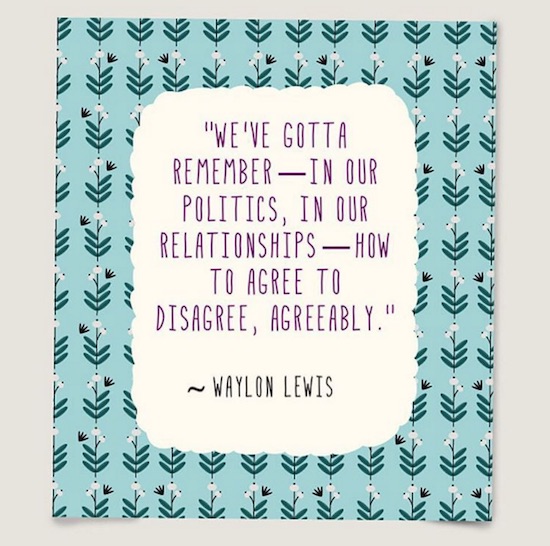“I don’t want to get political.”
I hear this statement every now and again, and under varying types of contexts. Sometimes it’s an attempt to distance ourselves from what we’re about to say, “I don’t like to get political, but this really bothers me.”
In other words, we’re saying, “I’m not a political person. I don’t take myself too seriously. I’m not some angry, man-hating SJW, or anything like that—it’s just this one particular subject that bothers me enough to make me say something.”
Sometimes it’s an attempt to silence people. “I’m tired of hearing about politics all the time,” as though we aren’t all tired of talking about politics all the time. Trust me, if we could stop, if we could feel sufficiently like we’d been heard and the battle was over and things were fine, then you would stop hearing about it.
But until then, the conversation continues.
And I get where the “I don’t want to get political” opinion comes from, I do. It’s a desire to not want to get involved, because getting involved is heavy and difficult and undesirable. It’s undesirable for everyone, trust me, I know. I am involved, so I know firsthand how tiring the whole thing can be.
And you’d think that my knowing that would make me more forgiving toward people who “don’t want to get political,” and yet every time that I see this statement, it irritates me.
It makes me want to say something.
There are two reasons for this.
First, saying “I don’t want to get political” comes from a place of privilege.
And, I know, I know—a good chunk of my readership just tuned out at the word “privilege,” but please, hear me out.
For many of us, getting political isn’t really something that we can choose. It’s something that follows us around, whether we want it to or not.
A woman is forced to “get political” every time that she speaks out against her sexual assault or harassment.
A person of colour is forced to “get political” every time they get profiled at the mall or some random person on the bus starts throwing racial slurs at them.
A queer person is forced to “get political” every time they get dressed in the morning or check out someone cute.
If you don’t quite understand what I mean by this, I think a good example would be the reality TV show “RuPaul’s Drag Race,” which stars a cast of drag queens and has discussed many political issues, including homophobia, H.I.V., and hate crime violence.
When asked if the show was intentionally political, show host RuPaul Charles responded by saying, “It’s inherent in our experience. We don’t have to do much to infuse a consciousness into the show. It is such a part of our story, and we walk with it.”
For many of us, we don’t even have to try to become political. We just…walk with it.
If someone gets to choose whether or not to “get political,” then the only reason they have that choice is because the experience that they live, is so normalized and accepted by society, that it isn’t even considered political anymore.
It just…is.
They aren’t considered a sexual orientation, they’re just the norm. They aren’t considered a race, they’re just the norm. They don’t have to fight for their rights or equality, they’re just accepted and free as they are.
They don’t have to worry about “getting political,” because nothing “political” affects them.
Except, everything is political, which brings me to reason two of why this statement bothers me.
When a person says, “I don’t want to get political,” they are still making a political statement. They have not excused themselves from the conversation altogether, but rather than taking the opportunity to side with either the bully or the victim, they have decided to take the safer route. They have become the bystander.
“Political” issues continue to happen. They just happen without any involvement from those who “don’t want to get political.” And if the bystanders are doing nothing, just standing back and watching, then the bullies continue to feel validated in what they are doing. I mean, why wouldn’t they? Nobody’s trying to stop them.
When nobody tries to stop them, that sends a political message, even if the message was unintentional.
And I’m pretty sure that the majority of the time, the message is unintentional. I don’t think that the majority of people who “don’t want to get political” are trying to be dismissive of other experiences, I think they just don’t understand.
They don’t realize that they are speaking from a place of privilege, that even if something doesn’t directly affect them, it still affects other people in a huge way.
But I think that this is a conversation that we need to have. Just because someone “doesn’t want to get political,” that doesn’t mean that they are exempt from the conversation.
~
Author: Ciara Hall
Image: Waylon Lewis/Elephant Instagram
Editor: Kenni Linden
Copy Editor: Lieselle Davidson











Read 0 comments and reply